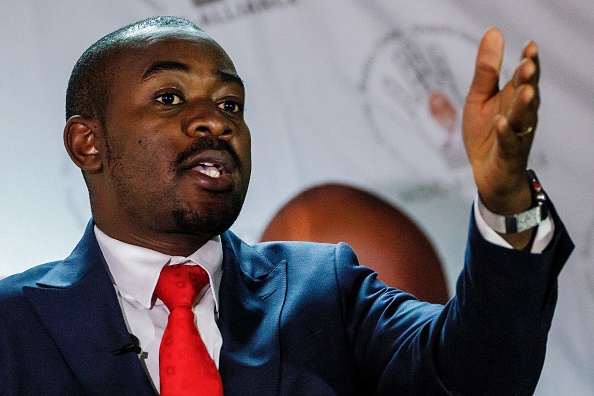Harare – An experienced politician with decades of activism under his belt, Zimbabwe’s 45-year-old opposition leader Nelson Chamisa is still known to many as “mukomana” or “the young man”.
The moniker reflects the age gap between the presidential hopeful and his main challenger in an August 23 vote — incumbent Emmerson Mnangagwa, 80.
It is also used to avoid uttering the politician’s name in public in a country where rights groups say his rival has unleashed a brutal crackdown on dissent.
Mineral-rich Zimbabwe is more and more like a “dictatorship”, Chamisa told AFP in an interview this year.
A lawyer and church pastor, Chamisa leads the Citizens Coalition for Change (CCC) — the only party harbouring any real hope of unseating the ruling ZANU-PF, which has held an iron grip on power since independence in 1980.
Still, the odds are stacked against it.
Some CCC rallies have been blocked, some of its members arrested and thrown in jail and fears of vote rigging are widespread.
Chamisa has seen it all before.
The lightly built, moustachioed Chamisa has been arrested several times for his political activities.
In 2007, he was severely beaten with truncheons and an iron bar and left for dead. He spent five days in hospital after the attack, which was widely blamed on ruling-party thugs.
In 2021 he was the target of what he calls an assassination plot when shots were fired at his convoy. A bullet ripped through the left rear seat of his car where he normally sits.
“I’m lucky to be alive,” he said.
Ego, hits and religion
He joined the opposition Movement for Democratic Change (MDC) as a student when it was founded in 1999 and took it over after the death of his mentor, party leader Morgan Tsvangirai, in 2018.
That same year Chamisa came close to beating Mnangagwa in a tight election, the first held after the ousting of longtime ruler Robert Mugabe.
He contested the result but lost in court.
Last year Chamisa broke away from the MDC and set up the CCC, determined to have another go at securing the top job.
He has promised to create a new Zimbabwe “for everyone”, tackling corruption, relaunching the economy and pulling the country out of international isolation.
Many voters disgruntled at widespread poverty and runaway inflation are rallying behind him, but he has not been spared criticism even from within his own camp.
“He’s extremely self-confident, I think to a fault,” said Nicole Beardsworth, a political analyst specialising in Zimbabwe at South Africa’s University of the Witwatersrand.
Chamisa’s centralised leadership style has stripped his party, commonly referred to as “triple C”, of its structures.
This is rooted in fears it could be infiltrated by the ruling party.
But critics say it has weakened the CCC, causing confusion and a lack of organisation in the run-up to the vote.
Some complain Chamisa has not been vocal enough in demanding freedom for popular CCC senior official and lawmaker Job Sikhala, who has spent more than a year behind bars, and has failed to articulate an alternative vision for Zimbabwe.
Religion is a recurrent topic in Chamisa’s messaging but analysts say this has alienated some in middle-class urban areas, where the party is stronger.
The word “God” appears more than 40 times in the CCC’s manifesto, which includes among its top priorities “making Zimbabwe a God-loving, God-honouring and a God-fearing nation”.
“God is in it” is the campaign slogan.
Political upbringing
Born in Masvingo, south of the capital Harare, Chamisa studied law and political science at the University of Zimbabwe and also holds a degree in theology.
He credits his career to his parents’ insistence that he should value education and excel in school.
As head of the Zimbabwe National Students Union in the late 1990s, Chamisa was among organisers of demonstrations against Mugabe’s government that resulted in colleges and universities being shut down.
Chamisa — who is married with one child — rose through the MDC party ranks, holding posts including leader of the youth wing and party spokesman.
Over the years, he has earned a reputation for delivering passionate speeches spiced with humour — a sharp contrast to the sombre Mnangagwa.
In the troubled power-sharing government after the 2008 election, he was the youngest member of cabinet, serving as information and communication technology minister.
“Chamisa is a very charismatic figure,” said Zimbabwean scholar Brian Raftopoulos.
“But his weaknesses are lack of accountability within his own party (and) a lack of a long-term vision.”
Follow African Insider on Facebook, Twitter and Instagram
Source: AFP
Picture: Getty Images
For more African news, visit Africaninsider.com


